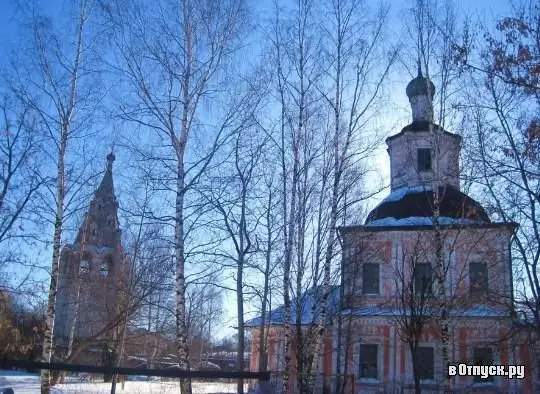
Description of the attraction
Vladimir churches are former Orthodox churches in Vologda. The winter church of the Archangel Gabriel was erected in 1684-1689, and the summer Vladimir church in 1759-1764. Both churches were built of stone. The warm Vladimir Church was built with funds provided by the merchant Gavrila Martynovich Fetiev, who was subsequently buried near it.
It is not known when the first Vladimir Church was founded. But the inscription preserved on the icon of the Vladimir Mother of God indicates that the wooden church was already in 1549, the documents stored in the church archive testify that the temple was built even before the reign of Ivan the Terrible. In the 16-17 centuries, after the Vologda Kremlin was built, the Vladimir Church was outside the city walls and was called the Posad.
From the entries in the chronicle book of 1627, it follows that there were two wooden churches (the tent-roofed temple of the Most Pure Theotokos of Vladimir and the Kletsky temple with the refectory of Theodosius of the Caves), and there is also a mention of the bell tower. In 1684-1689, in accordance with the will of a wealthy local merchant G. M. Fetiev, a new building of a winter church is being built from stone, consecrated in honor of the Archangel Gabriel with a side-altar in the name of Theodosius of the Caves. The old winter temple of the Archangel Gabriel made of wood was transported to the Toshen parish.
It is known that the Vladimir parish was one of the wealthiest in Vologda. In the 17th and 18th centuries, there were 80 parish courtyards in his possession. The icon of the Vladimir Mother of God is one of the most revered in Russia. According to legend, the prototype of the icon was written by the Apostle Luke. She symbolizes the love and tenderness of the Mother and the Baby. She is also considered the patron of the entire human race.
The Winter Vladimir Church was built in the manner of Russian ornamentation. Despite the fact that Patriarch Nikon prohibited the construction of tent churches, the Vladimir Church had two wooden tents. The two-hipped church is a representative of a small group of churches of the mid-17th century, which was formed under the influence of the capital's architecture of the Russian pattern. The presence of two tents at these temples was only a decorative element.
Simultaneously with the church, a separate tent-roofed bell tower was built. The bell tower of the winter Vladimir Church was built in the likeness of the bell tower of St. Sophia Cathedral. There were 14 bells on the bell tower. The weight of the largest bell was estimated at 200 pounds. The bell tower was completed by a high tent with a small dome, with cut-through windows-rumors, which were decorated with kokoshniks.
Inside the summer church, there were three sections: the refectory, the altar and the naos. The stone altar barrier, which has three openings: for the doors of the altar, the royal doors and the deaconer, separated the altar from the naos. Three arches led to the refectory from the main part of the temple. The architecture of the church reflected many details of cult architecture inherent in this period: a pentahedral apse, an increase in volumes - "cubic", window frames, jagged cornices. However, the influence of the new metropolitan school was also felt - window ledges, paired pilasters.
Vladimir's cold church was closed in 1928. Now in the building of the temple there is a glass workshop. In 1930, Vladimirskaya warm church was closed. The building was heavily rebuilt, the dome with the dome and the drums were dismantled. The premises are now used as a parking lot.
The fence, along with the gates, is completely destroyed. The pond between the temples is clogged and overgrown. Access to the monuments is difficult, viewing from the inside is impossible.






